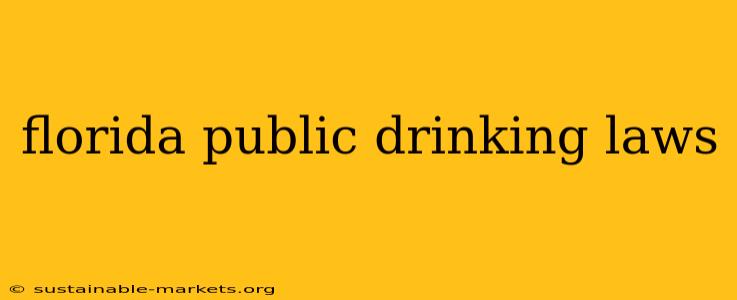Florida's sunny beaches and vibrant nightlife attract millions of visitors annually. However, enjoying these attractions responsibly requires understanding the state's often complex alcohol laws. This comprehensive guide breaks down Florida's public drinking laws, helping you stay informed and avoid legal trouble. We'll cover everything from open container laws to specific location restrictions, ensuring you can enjoy your time in the Sunshine State without incident.
Open Container Laws in Florida
One of the most crucial aspects of Florida's public drinking laws centers around open containers. Simply put, it's generally illegal to possess an open container of alcohol in public places. This means any alcoholic beverage with a broken seal or partially consumed is considered an open container.
Key exceptions exist, however. These often include:
- Designated areas within licensed establishments: Bars and restaurants with liquor licenses can permit alcohol consumption on their premises, usually within designated outdoor seating areas.
- Private property: Consuming alcohol on private property where it's permitted is generally legal. However, always obtain permission from the property owner.
- Specific events: Certain permitted events, such as festivals or parades, might have specific alcohol regulations. Always check local ordinances for details.
- Designated "consumption areas": Some municipalities have designated areas where open containers are allowed under specific conditions and with permits.
Penalties for violating open container laws range from fines to arrest, varying depending on the location and the circumstances.
Where is Public Drinking Prohibited in Florida?
Beyond the general open container laws, specific locations prohibit alcohol consumption, including:
- Public roads and highways: Drinking alcohol while operating a vehicle is strictly prohibited and carries severe penalties. Even possessing open containers in a vehicle while driving can lead to legal consequences.
- Public transportation: Drinking alcohol on buses, trains, or other public transportation is generally illegal.
- Schools and school grounds: Alcohol consumption is strictly forbidden near or on school property.
- Parks and beaches (often): While some beaches or parks might have designated alcohol-consumption areas, many prohibit open containers altogether. Always check local signage and regulations before consuming alcohol in these areas.
- Government buildings: Drinking alcohol on government property, including courthouses or city halls, is typically illegal.
Specific Considerations and Local Ordinances
It's crucial to remember that local ordinances can significantly impact public drinking laws. What is permissible in one city or county might be strictly prohibited in another. Always research the specific regulations for the area you're visiting. Websites of local law enforcement agencies or city/county governments often provide detailed information on local alcohol regulations.
Consequences of Violating Florida's Public Drinking Laws
Violations can result in:
- Fines: These can range from relatively minor amounts to substantial sums depending on the severity of the offense and repeat offenses.
- Arrest: Depending on the circumstances, you could face arrest and potential jail time.
- Criminal record: A conviction for violating public drinking laws can result in a criminal record, affecting future employment and other opportunities.
Responsible Alcohol Consumption
It's vital to prioritize responsible alcohol consumption. Knowing and respecting Florida's public drinking laws contributes significantly to a safe and enjoyable experience for everyone. Remember to always drink responsibly, designate a driver, and never drink and drive.
Disclaimer: This information is for general guidance only and does not constitute legal advice. For specific legal advice, consult with a qualified attorney in Florida. This guide is intended to provide a general understanding of Florida's public drinking laws and should not be substituted for professional legal counsel.

